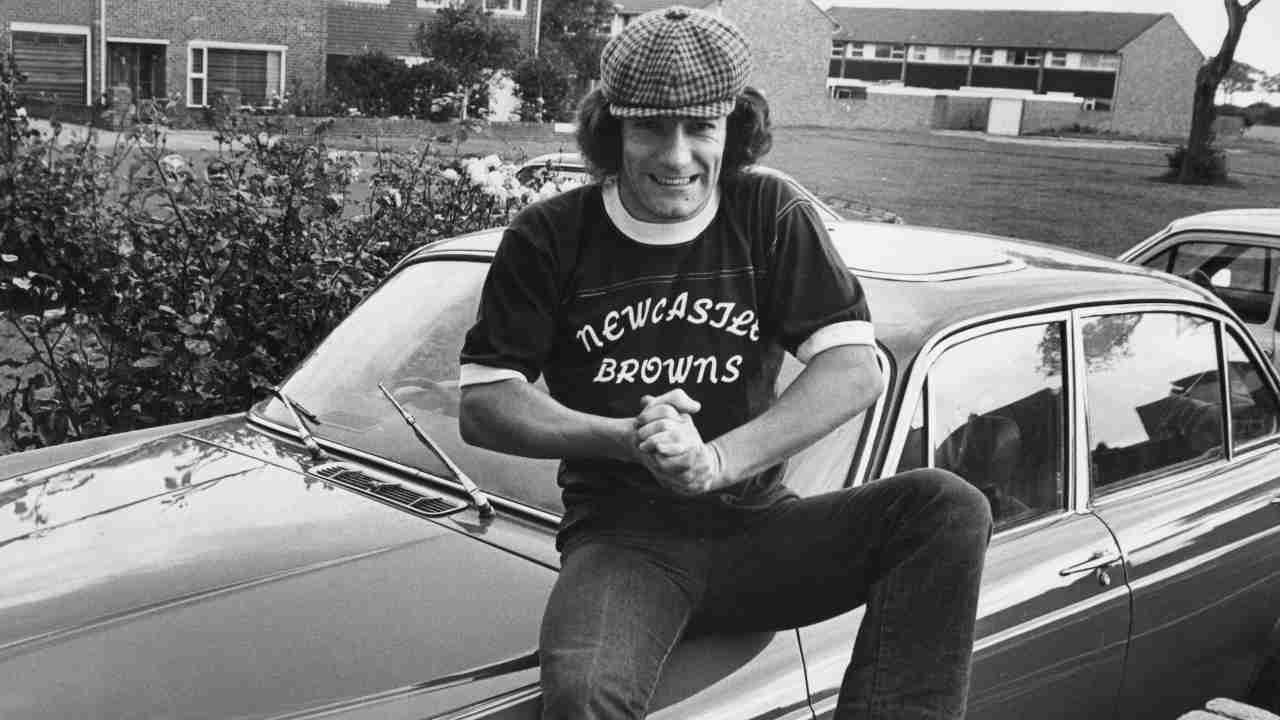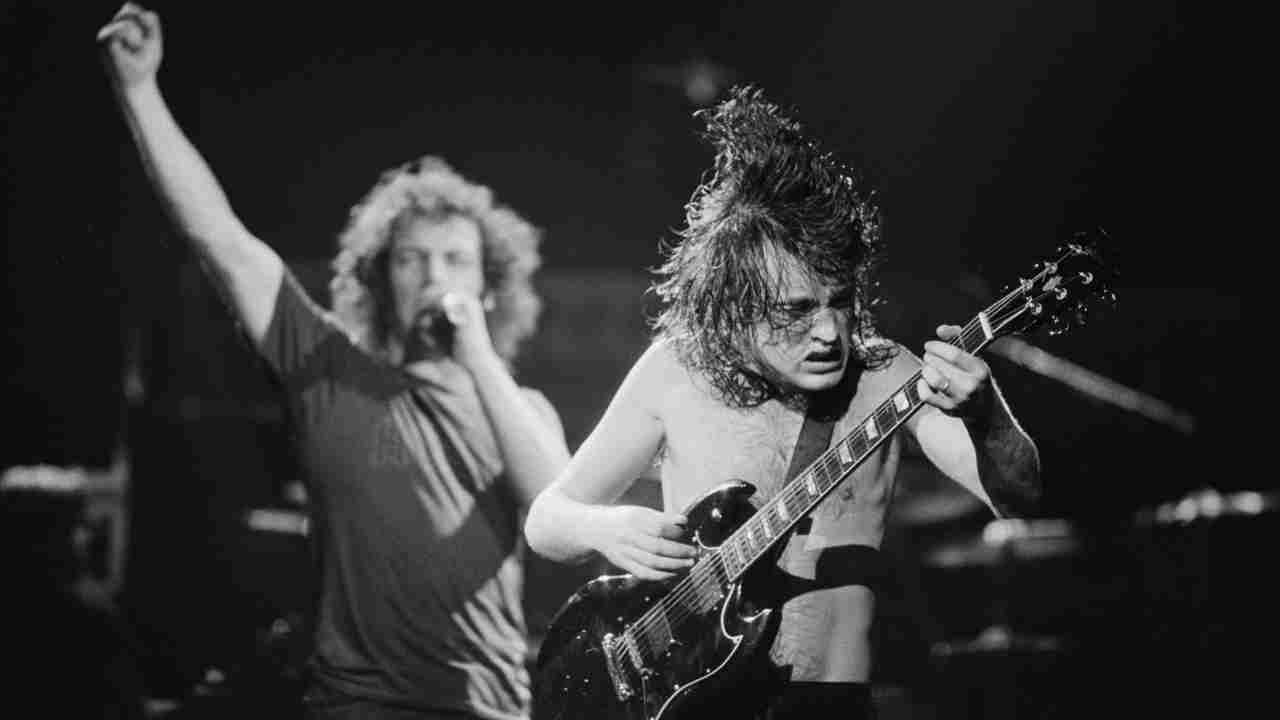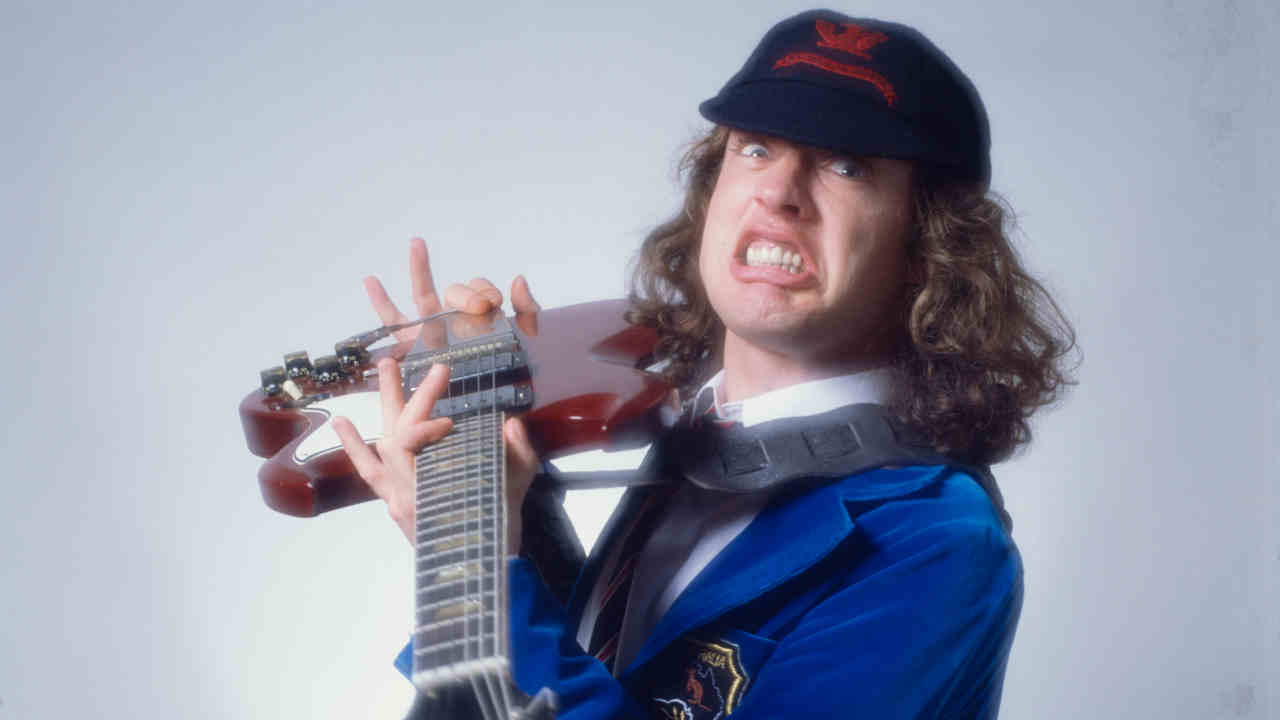Having sold almost 50 million copies, AC/DC’s Back In Black is the biggest rock album in history – but it emerged in the wake of the tragic death of singer Bon Scott. In 2008, guitarists Angus and Malcolm Young plus Bon’s replacement Brian Johnson looked back on the making of a masterpiece.

Mystery surrounds the precise nature of former AC/DC singer Bon Scott’s death to this day. It’s likely we will never know the exact whys and wherefores. But one thing’s for sure: the frontman’s sudden, unexpected end threw the band into turmoil.
Prior to Bon’s demise, the Aussie boogie merchants had been on the verge of a major worldwide breakthrough. They had been plugging away relentlessly since their formation in 1973. Enlisting super-producer Robert John ‘Mutt’ Lange to add a commercial sheen to their sound, 1979’s Highway To Hell had been a mammoth success on both sides of the Atlantic: Top 10 in the UK; Top 20 in the States. After six years’ hard slog traversing the globe, starting off in the shitholes and graduating to the stadia, they were poised to reap the benefits.
But then Bon Scott quaffed one tipple too many. On February 19, 1980, he was found dead in a car parked outside a house in South London, where he had been left to sleep off the effects of a heavy night. The official cause of death was put down to acute alcohol poisoning. Bon was 33.
Without their talismanic frontman AC/DC’s career was in danger of being shot down in flames. Guitarist Angus Young went into denial after Bon’s tragic death. The school uniform-wearing tyke had been exceptionally close to the lewd’n’crude crooner, Bon was much older than Angus, and the guitarist had lost a father figure as well as a friend.
“We were heartbroken,” Angus says bluntly. “OK, we knew the world had lost a big talent and our fans were devastated. But we as a band had lost much more. We had lost a person we bonded with in life. Honestly, we didn’t know what to do with ourselves at the time.”

The million-dollar question of finding a replacement singer wasn’t even on the agenda for AC/DC. The pain was too acute, and Bon wasn’t even buried.
Flying back to the UK after Bon’s funeral in Australia, Angus and his rhythm guitar-playing brother Malcolm were approached by Peter Mensch, AC/DC’s manager. Peter had drawn up a shortlist of projected new singers, and he shoved the list under the pair’s noses.
“I couldn’t be bothered,” Malcolm says dismissively. “I waved the list away. It wasn’t fucking right, you know?”
Returning to their adopted home of London, Angus and Malcolm (who, like Bon, were born in Scotland but emigrated to Australia at an early age) sat around and twiddled their thumbs. Time passed. They sat around and twiddled their thumbs some more.
Angus: “Eventually Malcolm called me up and said: ‘Instead of us just sitting around and moping, why don’t we do some work? At least that’ll keep us together.’ So we shut the doors and we didn’t think of record companies, managers, or anything like that. We just hid ourselves away and worked on our songs.”
The exercise proved to be extremely therapeutic. By focusing on their music, Angus and Malcolm were able to distance themselves from the trauma of Bon’s death. Block out the bad stuff and concentrate on their craft.
At this stage Angus and Malcolm still weren’t sure if AC/DC had a future. But in the back of their minds was the encouragement they had received from Bon’s father, Charles (aka Chick), at the funeral.
Angus: “Bon’s dad said to Malcolm and me: ‘You must continue with AC/DC. You’re young guys, you’re on the brink of major success and you can’t afford to give up now.’”
Angus and Malcolm decided to soldier on. It was an archetypal example of triumph over adversity.
“Malcolm and me had started the band and, subconsciously, I suppose, we didn’t want it to end,” Angus admits. “We didn’t want to leave things unfinished. Somehow, we couldn’t bear to turn around and say: ‘That’s it, we’re not going to do it anymore.’”
The news began to seep out: AC/DC were on the hunt for a new frontman. Then the sniping began. Certain factions of the music press criticised Angus and Malcolm for acting with unseemly haste, so soon after Bon’s untimely death.
“We knew we had to confront the question of a new singer,” Angus stresses. “But it wasn’t like we put an advertisement in a music paper that said: ‘AC/DC want a new frontman.’ No, that would have been too over the top. It was subtler than that. People like Bon are unique. They’re special. And we didn’t want someone to come in and copy him. If anything, we wanted someone who was their own character.”
The rumour mill started to grind. Numerous and varied frontmen were queuing up to stake a claim as Bon’s replacement. In the end AC/DC’s choice of new frontman caught everyone on the hop. Step forward a stocky fella in a cloth cap from County Durham in the North-East of England: Brian ‘Beano’ Johnson, singer with 70s glam-rock throwbacks Geordie. Strangely, Bon Scott had an influence on the choice of his successor, even from the grave.
Angus: “We knew Bon was a fan of Brian’s. Bon had seen Brian in England [in 1973] and had been very impressed. Bon was touring with a band he was in before AC/DC called Fraternity, and they opened up for Geordie.”
Brian Johnson – or ‘Jonno’, as he would become known – auditioned for AC/DC on March 29, 1980. Initially, he couldn’t find the rehearsal room where AC/DC were ensconced. The band waited patiently and then went on the lookout for him. They discovered him downstairs playing pool with their roadies.
“It put a little smile on our face,” says Malcolm, “for the first time since Bon.”
Brian put in an impressive performance at his audition, particularly on Whole Lotta Rosie, with lyrics written by Bon to celebrate sexual relations with a rather large woman measuring “42-39-56”.
It was a brave move to tackle a song so intimately associated with Bon. Brian wasn’t convinced he’d done enough to secure the job. Even when AC/DC offered him the position he remained skeptical.
“I remember thinking to myself: ‘Oh Brian, what have you got yourself into?’ I wasn’t scared, though, I was excited. I looked at it, like, well, if I do get fired I can tell me mates I was in AC/DC for a few weeks, and I’d had a nice holiday in London.”

The album that was to become the all- conquering Back In Black was recorded at Compass Point Studios in Nassau, Bahamas, at the end of April through to May 1980. Once again Mutt Lange was in the producer’s chair.
“There was a little bit of pressure to it,” Angus remarks, an understatement of major proportions. “A commitment that we had to complete the record by a certain date. But equally, it was a case of… we could’ve gone in and recorded some tracks and said, ‘No, we don’t like them, it doesn’t feel right.’”
When AC/DC’s plane touched down, the Bahamas was in the midst of a tropical storm.
“It was the best place to do that album because there was nothing going on,” Malcolm reveals. “We’d sit through the night with a couple of bottles of rum with coconut milk in, and work. That’s where a lot of the lyric ideas came from.”
The inclement weather inspired the opening lines to Back In Black’s first track, Hell’s Bells: ‘I’m the rolling thunder, the pouring rain/I’m comin’ on like a hurricane.’
But what about the remainder of Back In Black’s material? Angus admits: “A lot of ideas were in place before Brian arrived.”
But Angus vehemently denies the oft-repeated rumour that AC/DC took the majority of the lyrics from a notebook Bon Scott had left behind after his death. “No,” Angus insists, “there was nothing from Bon’s notebook.”
AC/DC polished off Back In Black in about six weeks. Given that working with producer Mutt Lange was – indeed, still is – a notoriously slow, painstaking process, this was something of a result.
Angus: “After Mutt made Highway To Hell he was in big demand, but I thought it was good for him [to record with AC/DC again]. Especially after what had happened to us. It’s to Mutt’s credit that he still wanted to be involved with us after Bon’s death.”
Brian Johnson breathed a big sigh of relief when recording sessions came to an end. “It was a beautiful sunny day and I went outside, got a ciggie out and sat among some trees. I was so happy that I’d done it. But I hadn’t really heard one song. I’d go in and do a couple of verses, pop back and do a chorus. That’s the way Mutt keeps you interested.”
Released in America on July 21, 1980 and in Britain and Europe 10 days later – no advance leaking of tracks via the internet in those long-ago days – Back In Black stormed to No.1 in the UK album chart. Over in the US it reached number 4, and stayed in the chart for an epic 131 weeks.
While being an emphatic celebration of AC/DC’s new line-up, Back In Black also paid tribute to Bon Scott.
“Well, that was the whole idea,” says Angus. “The cover was black and the album began with the sound of a tolling bell.”
To date, Back in Black has sold an estimated 50 million copies worldwide, making it the second highest-selling album of all time behind Michael Jackson’s Thriller.
Angus: “Those are incredible figures. Mind-boggling. All we’ve ever done, throughout our career, is record stuff we hope our fans will like. Nothing has been premeditated. That’s how we’ve always approached it. We’ve been that way since the beginning.”
What makes Angus so proud about Back In Black today?
“It’s the fact that we were strong enough at the time to keep ourselves together and see our way through a major tragedy.”
Gazing down from heaven or haring along the highway to hell, either way Bon Scott would’ve been proud.
Originally published in Metal Hammer issue 185, October 2008



